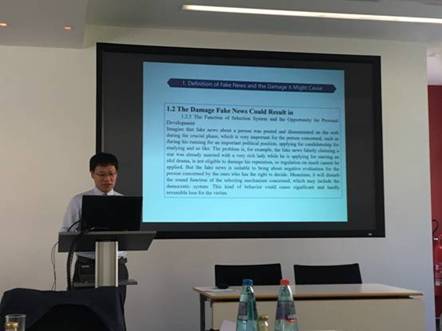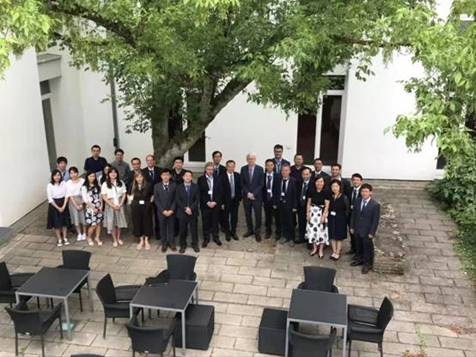On August 2-3, 2019, the Max Planck Institute of Foreign Criminal Law and International Criminal Law of Germany held an international academic seminar entitled Legal Control of Cybercrime: German and Chinese Legal Experiences. The conference was divided into five units: Public-private Partnership for Controlling Cybercrime, Legal Responsibility for Attacks on IT Systems, Criminalisation of Preparatory Cyber-activities, Combating Fake News in Cyberspace and Transnational Investigations in Cyberspace. Chen Jinlin, associate professor of Wuhan University School of Law and researcher of Network Governance Research Institute of Wuhan University, was invited to attend the meeting and delivered a speech entitled "Combating Fake News in Cyberspace: Chinses Legal Approach".

The speech was divided into three parts.
The first part dealt with the relevant legal norms and the scope of "false news" which corresponded substantially with fake news in practice, and made a comprehensive analysis of its possible consequences in the current Chinese context.
The second part of the speech analyzed the current system of regulating false news on the Internet. There were already relevant provisions in criminal law to protect reputation, property, social order in public places and national security from the threat or destruction of false news on the Internet. At the same time, the crime of illegal business operation and the crime of provoking trouble can also be used to regulate false news on the Internet.
The third part of the speech dealt with the necessity of perfecting the regulation system of network false news. He thought that the scope of "false news" should be strictly limited.

Chen Jinlin's speech triggered discussion among the participants. In the governance of false news in cyberspace, China was facing challenges that other jurisdictions had not yet faced. Therefore, Chinese scholars must explore relevant measures to deal with these challenges. Jurisdictions that had not yet faced such challenges were more inclined to protect freedom of expression. The exchange and communications of these two positions inspired scholars from different fields.
Edited by Su Yi & Wu Liuqing

